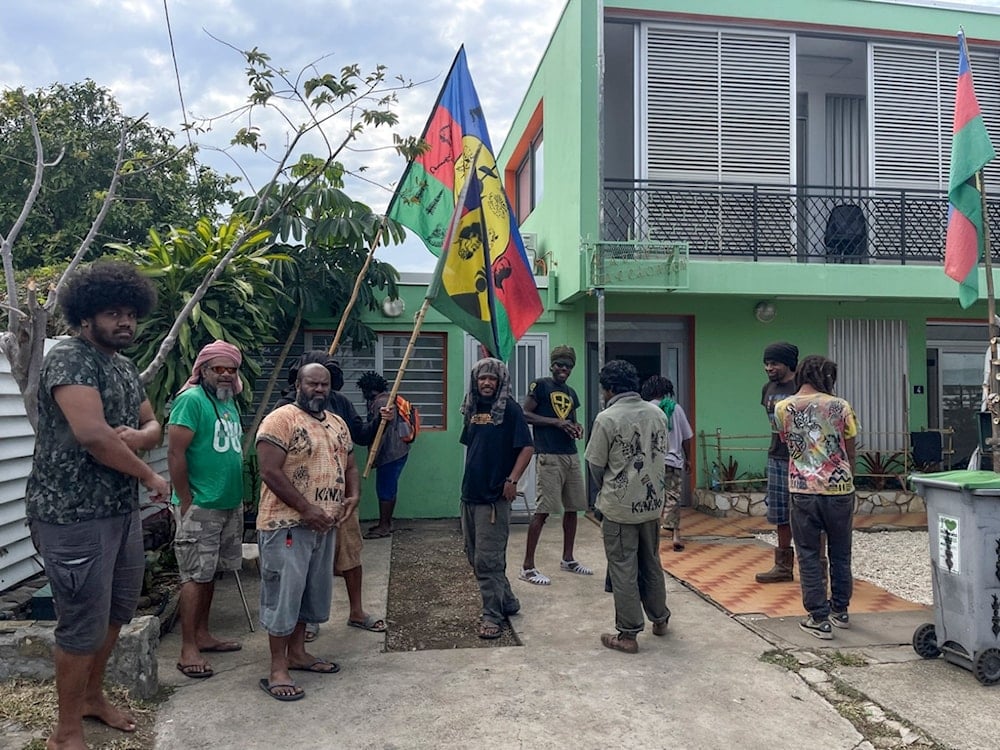New Caledonia’s FLNKS rejects election delay, urges vote next month
New Caledonia’s FLNKS rejects Paris’ plan to delay elections, warning of renewed unrest and calling for the vote to proceed next month under current rules.
-

Indigenous Kanaks hold independence flags as they gather near the Field Action Coordination Unit building during the 171st anniversary of France's takeover of the Pacific Archipelago, in Noumea, New Caledonia, Tuesday September 24, 2024. (AP)
The Kanak and Socialist National Liberation Front (FLNKS), New Caledonia’s main pro-independence coalition, has voiced strong opposition to Paris’ decision to postpone the territory’s regional elections, calling instead for the vote to take place next month under the existing electoral roll.
Speaking at a press conference in Noumea on Friday, FLNKS representatives said they were “deeply disappointed” by the French Senate’s approval of a bill to delay the elections until next year. The proposal is expected to be debated next week in the National Assembly, France’s lower house of parliament.
FLNKS member Romuald Pidjot denounced the decision, warning that the French government was repeating policies that previously inflamed tensions. “They are repeating the same mistakes,” he said, recalling that earlier changes to the voter list and election delays had triggered deadly unrest.
“This led to the May 13 uprising, in which 15 people were killed,” Pidjot added, referring to the May 2024 riots, the deadliest in New Caledonia in decades.
Regional elections in the French Pacific territory have already been postponed twice since last year amid disputes over voter eligibility and constitutional reforms introduced by Paris.
The Bougival Agreement and future of autonomy
In July, representatives from New Caledonia and the French government signed the Bougival Agreement in a Paris suburb of the same name, establishing what officials described as a “special-status state within France.”
The 13-page document confirmed that New Caledonia would remain “attached to France” while introducing a distinct New Caledonian citizenship. Voting rights under the accord are limited to those born on the island or who have lived there continuously for at least 15 years, a compromise aimed at addressing Kanak concerns over political marginalization.
The agreement also outlines a referendum to ratify the deal and sets out a plan for managing the archipelago’s vast nickel resources, which have long been exploited by French companies.
Unrest and fragile dialogue
Located nearly 17,000 kilometers from mainland France, New Caledonia has been the site of longstanding tensions between the indigenous Kanak population and pro-French loyalists. The May 2024 violence erupted after the French government advanced a constitutional amendment that expanded voting rights to long-term French residents, contradicting the 1998 Noumea Accord, which had granted the Kanaks a degree of political autonomy.
The unrest left prompted the deployment of thousands of French security forces. Following the violence, the French government reopened talks with pro-independence groups, eventually leading to the Bougival Agreement earlier this year.
Despite the progress, the FLNKS maintains that postponing elections risks reigniting tensions and undermining the fragile trust rebuilt through dialogue. “New Caledonia cannot afford another political crisis,” Pidjot said. “The people are ready to vote — and we will not accept another delay.”
The Pacific archipelago and former French penal colony has long been divided over its future, with French descendants advocating for continued French rule, while the Indigenous Kanak people have pushed for self-determination.

 3 Min Read
3 Min Read








